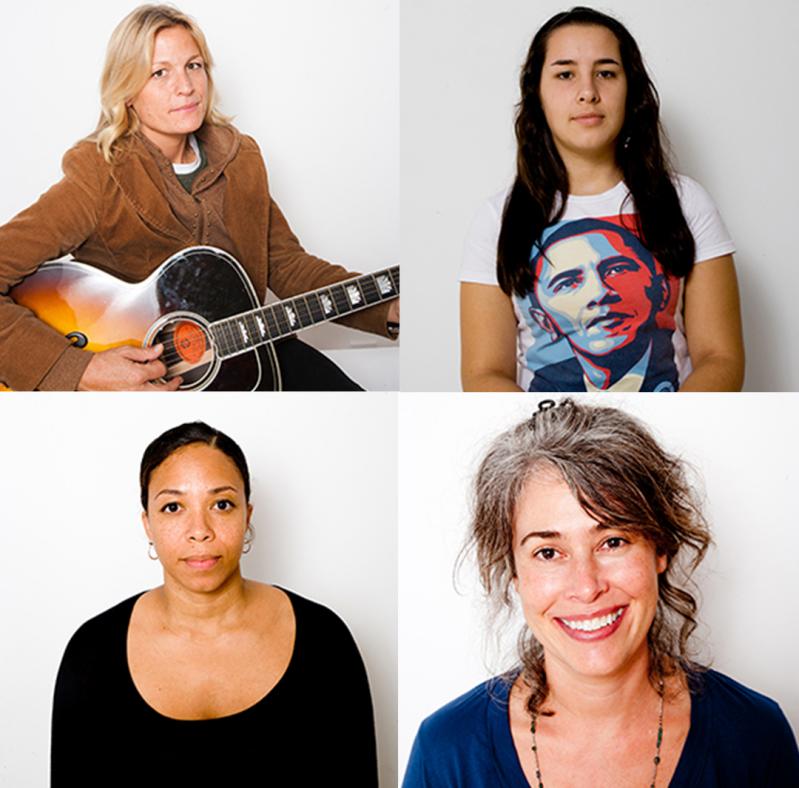On a Friday night in September 2008, Bastienne Schmidt, Toni Ross, and Philippe Cheng were at Kathy Engel's house in Sagaponack considering the claim of Sarah Palin, John McCain's running mate, that she was speaking for all women.
That meeting, less than two months shy of a historic presidential election, launched "The Sea We Wade," an oral history-photography/film project involving testimony from 175 East End women.
With the approach of a perhaps even more momentous election, Butter Lane Productions, a nonprofit created by Mr. Cheng and Ms. Schmidt, has issued a call for women willing to be photographed and interviewed between Tuesday and Nov. 4 for the film's next iteration.
During that initial conversation 16 years ago, "We decided, kind of innocently, to make some kind of statement about the East End," Mr. Cheng said. Two days later they sent an email to 30 women in their circle to come to Tinka Topping's field in Sagaponack to respond to Ms. Palin's claim.
Thanks to word of mouth and social media, 350 women showed up. The organizers invited the cinematographer Don Lenzer to film the event, which he did from a crane and on the ground.
"After we filmed everyone in the field, we brought a couple of women into the barn," Mr. Cheng recalled. "We had a simple black backdrop and we asked a couple of questions. In the course of editing, it became clear that in the interviews there was something so powerful. People really wanted to speak. It became imperative to interview as many of those women as possible."
Over a 10-day period before the 2008 presidential election, Mr. Cheng and Ms. Schmidt photographed and interviewed East End women from different backgrounds, age groups, and professions to create a visual, audio, and historical document of the moment and what it meant to them. The result is the first part of "The Sea We Wade," a 30-minute film during which the subjects were asked how they were feeling about the election specifically and the politics of that moment.
Many said they'd never sat for the camera before, but "just by giving someone the opportunity to speak is enough to draw many people out," said Mr. Cheng.
The film, which can be seen on Vimeo, is straightforward and mesmerizing, with each woman filmed head-on, speaking against the black background. It has had only one public showing.
In August, after President Biden withdrew and Vice President Harris became the Democratic nominee, Mr. Cheng felt the upcoming election would be just as historic, if not more so, and decided it was time to update the film, "even if I have to go house-to-house to do the interviews."
He won't have to. Instead, the film sessions for the next part of "The Sea We Wade" will happen at 430 Butter Lane, Bridgehampton, from Tuesday through Nov. 4. Sessions can be booked by emailing [email protected] or visiting the Butter Lane Productions website.
Prospective speakers have been asked to allow 40 minutes of their time for the sessions. Upon arrival, each woman will be asked to sit for a still portrait, followed by a short filmed interview. The main question: "How are you feeling and what is most consequential for you at this moment?"
Mr. Cheng, who is an artist and photographer, cited as two inspirations for "The Sea We Wade" Andy Warhol's Screen Tests and Dave Isay's StoryCorps, for which Mr. Isay interviewed no fewer than 645,000 people. Each conversation is preserved at the American Folklife Center at the Library of Congress.
Mr. Cheng also mentioned Studs Terkel, the Pulitzer Prize-winning writer and broadcaster known for his oral histories of everyday Americans. "You go out into the world and find stories in the most unexpected places," he said.
"If Kamala becomes president," he added, "the first woman, the first woman of color, I'll have these two primary archives of one community, some of the same women over these 16 years, speaking about these two incredibly momentous elections."
It is important to Mr. Cheng that "The Sea We Wade" reflects the diversity of the East End. "From the outside, we look like a very wealthy, homogeneous kind of community, but the reality is we live in an incredibly diverse community with many issues that any community in the country faces, if not more so because of the wealth disparity here."
He is not interested in creating a conventional documentary. "I want to create a civic, political, lyric poem in the form of a film that will take parts of these interviews. I don't know the shape of it yet, but I want it to be in the voices of the women telling the story somehow. I don't quite know how yet."




